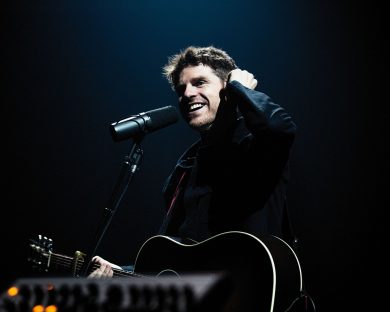Between October 2019 and December 2020, singer-songwriter and guitarist Vincent Vallières co-produced his eighth album with his good friend, guitarist André Papanicolaou.
 “At this time last year,” he says, “we were pretty far along in the process we had planned out, several songs were quite arranged, others were even mixed and finalized,” says Vallières. “The step back made me doubt. During the first two or three weeks, I asked myself if that’s what I really wanted to do, what I really wanted to say, so we started all over again. We put aside what we’d done to build something else next to it, with other materials.”
“At this time last year,” he says, “we were pretty far along in the process we had planned out, several songs were quite arranged, others were even mixed and finalized,” says Vallières. “The step back made me doubt. During the first two or three weeks, I asked myself if that’s what I really wanted to do, what I really wanted to say, so we started all over again. We put aside what we’d done to build something else next to it, with other materials.”
And nothing affecting him was left out: “The people I meet, my friends, my neighbours, my human interactions,” he says. “This kind of fear and this loneliness, which increased ten-fold. And we’re just realizing all of its perverse effects. It’s one of my best albums, because of this global reflection of who I am.”
Toute beauté n’est pas perdue (All Beauty Is Not Lost) offers a solidly-delivered brand of folk-rock, powered by regal guitar riffs, which serve as the backdrop for intelligent lyrics.
And speaking of guitars, all the famous brands are mentioned in the booklet: Gretsch, Rickenbacker, Danelectro, Gibson, Fender Precision… “The Rickenbacker has quite a strong personality,” the guitarist confides. “When I play ‘Homme de rien’ through my small Fender Champ amp, I discover a tone that was there all along during this project.”
Then along came Michel-Olivier Gasse, a loyal musical partner, Marc-André Larocque on drums, and Amélie Mandeville, who sang on Vallières’ previous record and tour. And also, Ingrid St-Pierre, who sings on “On dansera sous la pluie.” “I wrote that for my youngest daughter Marie, it’s a very intimate song,” says Vallières. “Her singing lifts the song up. There’s a certain innocence that comes out, like a ray of sunshine.”
As the last piece of the puzzle, Vallières and Papanicolaou tapped Martin Léon to be the project’s artistic director. “I wanted to open a dialogue with him so he could challenge my ideas,” says Vallières. “I believe Martin is one of Québec’s best songwriters. We worked in a very intimate context. He’d read a text and ask me what I meant to say, to make sure my intentions truly came across.”
And Léon didn’t show up empty-handed. “His role was to make the words as crystal clear as possible,” says Vallières. “He knows how to listen, and he’s poetically demanding – much more impressionistic than I can be. It created some quite pleasant tension!”
For example? ‘Heille Vallières,’ the album’s opening track. “Getting to the version you hear took quite some time, and Léon reminded me of Gérald Godin’s poem T’en souviens-tu Godin ? where the poet talked to himself,” says Vallières. “The goal was to open the album’s dialogue, as well as opening a dialogue with myself. It’s like a wake-up call! Do you still have a sense of wonderment? Are you still able to surprise even yourself?”
If we needed proof that the man has good taste, and knows how to surround himself with able contributors, that’s it. “Being able to put my ego aside to serve my song is going to make it better,” he says. “I don’t think I had that humility when I was 25. I did it before with Eric Goulet, my first mentor, who has a very developed rock and literary sense. I also did it with Philippe B. – they’re both great song-makers.”
On the very 60’s-influenced “Je suis comme toi,” which evokes The Byrds, Vallières reveals one of their studio tricks. “We mixed an acoustic 12-string guitar with the Rickenbacker sound!” Another one of the album’s little pearls is “Le jardin se meurt,” which was also made into a live video that includes a six-minute-long shot that’s part of a short film – both a documentary and a performance film – that will be released at the same time as the album.
“Entre les étoiles et toi” is graced with a beautiful video by Noisy Head Studios: a boy and girl ride in a convertible through space, on a road shaped like a guitar’s fretboard – with a heart as big as a planet, Vallières knows how to create a buzz with his videos.
And then there’s a monumental duet with Marjo, “Tout n’est pas pour toujours,” a true moment of grace. And the album’s only song without guitars, instead it’s a mellotron jewelry-box for Marjo’s voice. Soft and efficient, as only she can be.
“Marjo is mainlined on the heart,” says Vallières. “I sent her the song and she replied the next day, saying it’s a truly beautiful song, and she insists on singing it. The guys and I looked at each other and were amazed that she wanted to sing it. There’s something pure about that woman. The amount of preparation she goes through is nothing short of inspiring. She called me to know. ‘How do I sing this or that passage, what’s the harmony going to sound like?’ She doesn’t want to fool around, she wants to deliver a performance. She wants to have fun, but she’s fully prepared, too.”